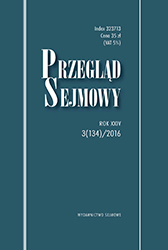Sprzeciw sumienia w orzecznictwie ETPC (na podstawie wyroku Wielkiej Izby z 7 lipca 2011 r. w sprawie Bayatyan v. Armenia)
Conscientious objection in the jurisprudence of the European Court of Human Rights (in the light of the Grand Chamber judgment of 7 July 2011 in the case of Bayatyan v. Armenia)
Author(s): Jacek FalskiSubject(s): Constitutional Law
Published by: Kancelaria Sejmu
Keywords: human rights; ECtHR case law; conscientious objection; freedom of conscience; freedom of thought; conscience and religion; adjudicative methods; convention criteria
Summary/Abstract: The article provides an analysis of judgment of Grand Chamber of the European Court of Human Rightsof 7 July 2011 in the case of Bayatyan v. Armenia, in which the Court, based on the “living instrument”doctrine, gives — inter alia — a new creative interpretation of Article 9 of the Convention. In this interpretationthe Court broadened its scope of protection to include conscientious objectors, to autonomous extent, within the full meaning of this prerequisite not functionally limited to matters relating tothe armed service, which might be indicated by the scope of the case considered.
Journal: Przegląd Sejmowy
- Issue Year: 2016
- Issue No: 3
- Page Range: 7-19
- Page Count: 13
- Language: Polish

